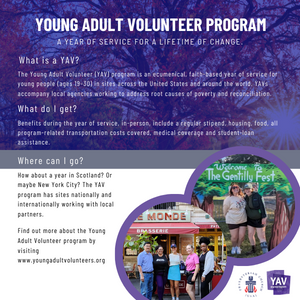Opening a door to discussions on racial relationships
By Alyssa Sickle, Coordinator of Membership and Development
 How can we help volunteers experience, engage, and embrace communities across racial and social classes? DOOR volunteers are encouraged to take these steps while they live and serve in inner-city communities. Krista Dutt, National Program Director and DOOR Chicago Director, shares how their volunteers are challenged to think about race relations in new ways and are encouraged to fully experience life in diverse cities.
How can we help volunteers experience, engage, and embrace communities across racial and social classes? DOOR volunteers are encouraged to take these steps while they live and serve in inner-city communities. Krista Dutt, National Program Director and DOOR Chicago Director, shares how their volunteers are challenged to think about race relations in new ways and are encouraged to fully experience life in diverse cities.
Discovering Opportunities for Outreach and Reflection (DOOR) is a network of urban service-learning programs in Atlanta, Chicago, Denver, Hollywood, Miami, and San Antonio. Originating out of a Mennonite Central Committee project in Denver, the ecumenical program’s mission is to “expose, educate, challenge, and motivate participants to respond to the issues and concerns facing an increasingly urban world.”
DOOR’s motto is “See the face of God in the city.” Krista expands, “We believe that God is alive and working in the city. Therefore when volunteers come to us, the inner city stereotypes that they have often heard are challenged. They all will say, ‘racism is wrong, diversity is good,’ but when really confronted with it among people with whom they live and work, it’s harder to explain away.”
DOOR invites individuals and groups to serve in the cities. Volunteer opportunities are available for week or weekend, summer, and year-long commitments. These programs are named “Discover,” “Discern,” and “Dwell,” respectively.
Krista describes, “We have weekend and weeklong volunteers who we hope ‘discover’ the city differently than just the stereotypes that they see on TV. We have support staff that come for the summer and hopefully learn more deeply what it means to be in the city and start ‘discerning’ what that means for their faith. We have year long folks that ‘dwell’ in the city and need to develop new ways of understanding with eventual effects on their faith and vocation.”
The weekend and weeklong volunteers are exposed to the lifestyle and patterns of the city. Guided reflection teaches the volunteers how to think differently of the city and their home area. When race issues arise, volunteers can see the beauty of a diverse inner city, Krista notes.
For some volunteers, their DOOR experience was the first time they have been a minority, or find themselves in a situation like being the only white person on a bus.
“DOOR allows people to experience something that’s non-white,” Krista comments.
One favorite activity that DOOR uses with groups is the “Dollar Meal” night. Each volunteer is given $1, sent out into the city, and are told to use that dollar to buy dinner. Krista says that each group has a different experience. Some pool their money and buy food a grocery store to feed everyone. Others ask restaurants if there is any leftover food that was going to be thrown out. They are allowed to ask for money, but must explain the volunteer program and point of the lesson. Krista and the DOOR staff have found that this lesson helps volunteers connect with the tough situation and choices that local city residents or homeless people, living on close to nothing, experience every day.
Those who have a longer time to experience and live in the neighborhoods are able to more fully reflect on what they are learning and start to understand the complex nature of living and working in a city. Volunteers are asked to attend a local church during the duration of their program. For some, this can be a unique growing experience and special connection with the neighborhood.
Community days are an important part of service with DOOR, when there are discussions and reflections on what the volunteers are experiencing. The lessons and discussion enables the volunteers to learn about the structural nature of racism and classism specific to the city where they live.
“This helps the volunteers have a deeper context to what they are experiencing each day,” Krista says.
Krista mentioned one volunteer, Aubrie, who served as a summer volunteer for three years with DOOR in Chicago, and then participated in Teach for America. Now, Aubrie is living and teaching in the same neighborhood she got to know through her experience with DOOR. Krista says that Aubrie’s service with DOOR taught her to value diversity and the stories of people different than herself.
“When our volunteers start understanding the issues that surround poverty, race and class,” Krista shares, “the power of the stereotypes is diminished.” Seeds planted within a volunteer, encouraging them to question the social norms, reach across the street and help a neighbor in need, can have a lifelong impact on both the volunteer and the community they serve.”
Discovering Opportunities for Outreach and Reflection (DOOR) is a faith based network of urban service learning programs that expose, educate, challenge and motivate to respond to the issues facing an increasingly urban world.
 How can we help volunteers experience, engage, and embrace communities across racial and social classes? DOOR volunteers are encouraged to take these steps while they live and serve in inner-city communities. Krista Dutt, National Program Director and DOOR Chicago Director, shares how their volunteers are challenged to think about race relations in new ways and are encouraged to fully experience life in diverse cities.
How can we help volunteers experience, engage, and embrace communities across racial and social classes? DOOR volunteers are encouraged to take these steps while they live and serve in inner-city communities. Krista Dutt, National Program Director and DOOR Chicago Director, shares how their volunteers are challenged to think about race relations in new ways and are encouraged to fully experience life in diverse cities.



 Thousands of faith-based service opportunities can be at your fingertips with the RESPONSE. Download the latest edition today!
Thousands of faith-based service opportunities can be at your fingertips with the RESPONSE. Download the latest edition today!
